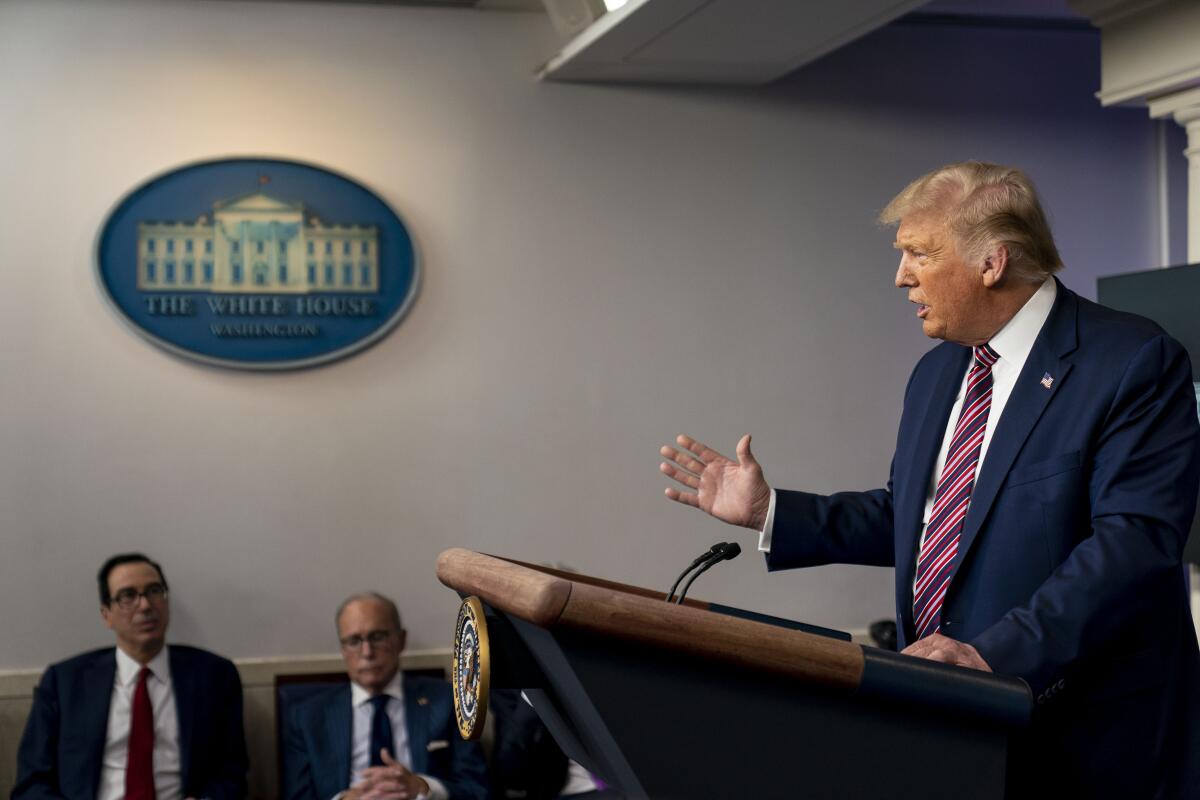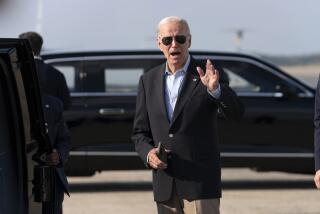Trump’s 2016 campaign chair communicated with Russian intelligence, bipartisan Senate panel finds

- Share via
WASHINGTON — President Trump’s 2016 campaign eagerly capitalized on Russia’s efforts to meddle in the U.S. election four years ago, according to a bipartisan Senate Intelligence Committee report that raises new concerns about connections between his top aides and Moscow.
As Russian military intelligence officers were releasing hacked Democratic Party emails through WikiLeaks, the report said the Trump campaign “sought to maximize the impact of those leaks” and “created messaging strategies” around them.
The report, released Tuesday, found that the Trump campaign “publicly undermined” the U.S. intelligence community’s conclusion that Russia was behind the email hack and “was indifferent to whether it and Wikileaks were furthering a Russian election interference effort.”
The 966-page document describes Paul Manafort, the president’s former campaign chairman who is serving prison time for financial crimes, as a “grave counterintelligence threat” because of his relationship with Konstantin Kilimnik, a business partner in Ukraine who is conclusively described as a “Russian intelligence officer.”
Although Kilimnik has been the target of scrutiny before, the report adds a new wrinkle, saying the committee “obtained some information suggesting Kilimnik may have been connected to the GRU’s hack and leak operation targeting the 2016 U.S. election.” GRU is an acronym for Russian military intelligence; no such allegation has previously been made, and details are redacted from the report.
Manafort and Kilimnik used encrypted messaging applications and codes to communicate, sometimes telling each other to look at the “tea bag” or the “updated travel schedule” when it was time to check the email account they shared. Some phones were referred to as “bat phones,” the report states.
The report is the fifth and final volume from the Senate Intelligence Committee’s investigation into Russian election meddling. It arrives soon after Trump’s own intelligence officials warned that Moscow was revisiting its playbook ahead of the 2020 election by trying to undermine Democratic candidate Joe Biden.
Although the latest report does not dramatically alter the public’s understanding of Russia’s operations in 2016, it’s the most comprehensive examination yet and it represents a rare bipartisan consensus on a hotly contested topic.
A statement from Trump’s campaign called claims of collusion with Russia the “greatest political scandal in the history of this country.”
The report includes new details about Roger Stone, Trump’s longtime political advisor.
Although Trump previously said in written answers to special counsel Robert S. Mueller III that he did not recall discussing WikiLeaks with Stone, the committee concluded that “Trump did, in fact, speak with Stone about WikiLeaks.”
After Stone told Trump and other campaign officials in either April or May 2016 that WikiLeaks would release information damaging to Democratic candidate Hillary Clinton, the report states that “Trump directed campaign officials to stay in touch with Roger Stone about future WikiLeaks activities regarding Clinton-related emails.”
It’s unclear whether Stone knew in advance that WikiLeaks was releasing hacked emails, but the report said he repeatedly communicated about the topic with Trump campaign officials, and “at their direction, Stone took action to gain inside knowledge.”
“In August 2016, following the campaign’s tasking, Stone obtained information indicating that John Podesta would be a target of an upcoming release, prior to WikiLeaks releasing Podesta’s emails on October 7,” the report found. Stone communicated this information to Trump and other senior campaign officials.
Trump has since commuted Stone’s sentence for lying to Congress and witness tampering, sparing him prison time.
Podesta served as Clinton’s 2016 campaign chairman, and the release of embarrassing details disclosed in his stolen emails dominated the final weeks of the campaign.
According to the report, WikiLeaks “likely knew it was assisting a Russian intelligence influence effort,” and Trump allies tried to spur more releases to help his campaign.
For example, the Trump campaign team heard about the “Access Hollywood” videotape an hour before it was revealed by the Washington Post. Stone told Jerome Corsi, an associate in right-wing circles, to get WikiLeaks to “drop the Podesta emails immediately.”
WikiLeaks did so 30 minutes after the story about the tape was published, although it’s unclear whether any message was communicated between Corsi and WikiLeaks.
At the same time Stone was trying to learn about WikiLeaks’ plans, he was helping Trump draft tweets friendly to Russia, the report said. In an email to Trump’s assistant titled “Tweets Mr. Trump requested last night,” Stone suggested tweeting “I want a new detente with Russia under Putin.”
The concerted effort to harness an illegal Russian operation to harm Clinton’s candidacy undermines Trump’s frequent claims of “no collusion” between his campaign and Moscow.
No criminal conspiracy, however, was established by Mueller, who ultimately did not charge any members of the president’s campaign with working with Russians.
The Senate Intelligence Committee was alarmed by efforts to mislead or stonewall its investigation.
According to a letter reviewed by The Times last week, the panel told federal prosecutors last year that three witnesses — including former campaign strategist Stephen K. Bannon — may have provided false testimony. Lying to Congress is a felony.
In addition, the latest report said the White House tried to limit testimony to the committee with claims of executive privilege that had “no basis in law.”
By comparison, former officials from President Obama’s administration “freely shared their conversations.”
The committee was also concerned about whether anyone encouraged Michael Cohen, the president’s former personal lawyer, to lie about Trump’s pursuit of a luxury skyscraper in Moscow during the campaign.
After Cohen testified to the committee for the first time, he said he received a call from Jay Sekulow, one of the president’s other lawyers, who said Trump “heard you did great” and there could be “pardons” or “pre-pardons” down the line.
Sekulow denied the allegation to The Times on Tuesday. “There were no discussions with Michael Cohen about pardons or pre-pardons,” he said.
Republicans and Democrats are in consensus on the facts in the report, which involved more than 200 witnesses and 1 million pages of documents. But each side framed the findings differently.
“We can say, without any hesitation, that the committee found absolutely no evidence that then-candidate Donald Trump or his campaign colluded with the Russian government to meddle in the 2016 election,” acting Committee Chairman Marco Rubio (R-Fla.) said in a statement. “What the committee did find, however, is very troubling. We found irrefutable evidence of Russian meddling.”
According to Rubio, the committee also found that “Russia took advantage of members of the [Trump] transition team’s relative inexperience in government, opposition to Obama administration policies, and Trump’s desire to deepen ties with Russia to pursue unofficial channels through which Russia could conduct diplomacy.”
In a separate statement, Sen. Mark R. Warner (D-Va.), the highest-ranking Democrat on the committee, called the report “the most comprehensive examination of ties between Russia and the 2016 Trump campaign to date — a breathtaking level of contacts between Trump officials and Russian government operatives that is a very real counterintelligence threat to our elections.”
Richard M. Burr (R-N.C.), who as chairman oversaw the committee’s investigation until stepping aside in the spring, said Russia’s ongoing interest in interfering with democracy shouldn’t be skimmed over in the report.
“One of the committee’s most important — and overlooked — findings is that much of Russia’s activities weren’t related to producing a specific electoral outcome, but attempted to undermine our faith in the democratic process itself. Their aim is to sow chaos, discord, and distrust. Their efforts are not limited to elections. The threat is ongoing,” Burr said in a statement.
The report does not focus on Russia’s attempts to meddle in the 2020 election, but there are hints of the ongoing operation. For example, Kilimnik used a Twitter account — “registered under a false persona” — to spread allegations about Biden and corruption in Ukraine.
Trump later asked Ukraine’s president to investigate Biden, a conversation that led to his impeachment by the Democratic-led House of Representatives. He was acquitted by the Republican-led Senate.
U.S. intelligence officials have said publicly that Moscow is trying to undercut Biden with allegations involving Ukraine, where his son was on the board of a gas company. But Trump has once again tried to downplay the threat. “I don’t care what anybody says,” he said recently, while amplifying Russian disinformation.
For example, U.S. intelligence officials said a Kremlin-linked Ukrainian politician was releasing recordings of Biden’s phone calls from when he served as vice president. Trump shared details from the recordings on Twitter on Sunday, retweeting an account that has since been suspended.
More to Read
Get the L.A. Times Politics newsletter
Deeply reported insights into legislation, politics and policy from Sacramento, Washington and beyond. In your inbox three times per week.
You may occasionally receive promotional content from the Los Angeles Times.












